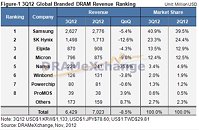DRAM Price Decline Results in 8.5% QoQ Decrease in DRAM Industry Value
According to DRAMeXchange, a research division of TrendForce, as PC shipments are continually adjusted downwards and yearly growth has decreased by 5% YoY, demand for the peak season is not as strong as expected and the oversupply situation continues to worsen. As a result, contract price for 2 Gb chips fell by 22.5% in the third quarter, from US$1.11 in July to US$0.86 in September. Server and mobile DRAM are also showing falling price trends, resulting in an 8.5% drop in the value of the DRAM industry compared to the previous quarter; DRAM suppliers' revenues are falling across the board. However, looking at third quarter demand, with strong shipments for mobile devices like smartphones and tablet PCs, mobile DRAM accounted for 25% of total DRAM output, a significant increase from less than 20% in the second quarter. Consequently, market share is on the rise for memory makers with higher mobile DRAM ratios, like Samsung and Elpida. For the DRAM industry, improving core competitiveness lies in proper product adjustment, the key to profitability with such bleak market conditions.


